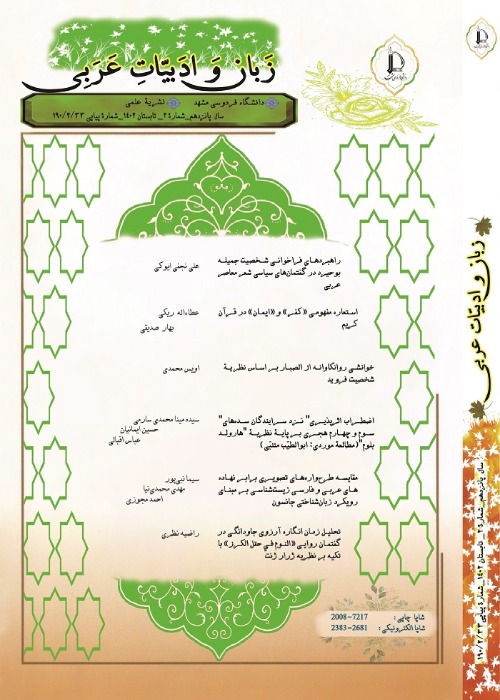A Look at Adages and Aphorism in Khorasan's Literature (The 10th and 11th Centuries)
Author(s):
Abstract:
Adages and aphorism, notwithstanding their differences, are considered to be the most veridical of literary tools, revealing nations internal and external mentalities. As the garnish of words along with a means of bolstering the power of argument, they have been prevalent in all literary eras and constitute one of the major, precious branches of literate and are credible documents of bygone customs, culture, and traditions, through which forebears thoughts and opinions together with their ways of reflection and mentalities can be laid bare. Undoubtedly, among the symbols of every countrys culture, civilization and literature are its adages and aphorism or apothegms and sage sayings, exuding from the mind and thoughts of elites of science and literature or the common people of a land, spreading mouth to mouth, from one generation to the next. All the living languages of the world, specifically Persian, are replete with adages and aphorisms, each with its own specific sweetness and beauty, in its place, denoting opulent tastes, thoughts, and euphemism in rendering meaning, so much so that multifarious opuses based on nations and peoples culture have been penned. Adages and aphorism are, in fact, the very popular customs, traditions, and renditions, endued with anecdotes, religious teachings, hints, preaching, and advices, forming the basic structure of social, political, religious, and cultural life in human societies in the light of which, people and generations find their identity. Iran, with an ancient, historical background, is the land of adages and aphorisms and all over the country, scholars and literati have made enormous strides in this respect, leaving us with worthwhile compilations; among them, Khorasan holds an outstanding, unique position. It wont be unwarranted to claim that the literati of this land have outstripped many other nations in the distribution of culture and civilization and the likes of al- Thalabi along with other intellectuals of that era such as Abubakr Kharazmi, Abulfath Basti, Badiozaman-e-Hamadani, Abolfazl-e-Mikali etc. are among the outstanding, unique examples whose names glorify the cultural diadem of, not only Iran and Khorasan, but also the Arab and Islamic world. In this paper we aim to investigate the adages and aphorism used in the numerous, unparalleled oeuvres of these luminaries, among most of which, the vestiges of religion and belief in Islam is ostensible.As a word, aphorism(in its Persian sense) conveys such meanings as: justice, wisdom, knowledge, sage saying, faithful promise, and realization of truth; it is a rationale and reason inculcated by God enabling the man to distinguish between lawful and unlawful and discern what is logical and what is not; just as He has bestowed us with the vision to witness the visible. In Koran, this word has been used to mean the descended book, wisdom, guidance, awareness, and understanding. But aphorism, which (in Persian) means similarity and sameness, is a short saying distilled from years of human experience in various fields, becoming universal due to its clearness and smoothness of meaning and its sublime combination, being used, unchanged, or with minor changes, by plebian and gentility in conversations. Adages and aphorism are among the essential elements of the language and literate of every nation and people, indicating and portraying their taste, initiative, moral, and ethical characteristics, thoughts and visions, together with their customs and traditions and each, having a hortative purpose, succinctly or diffusely, guides its audience towards a transcendent goal. In this respect, proverbs, enjoying a higher degree of verbal and spiritual beauty, are more established in comparison with aphorism. In this paper, we have tried, relying on the opus of Khorasans intellectuals, to lay eyes on some of these worthwhile and prevalent meanings, which with a social and ethical approach, using the element of religion, aim to express the ideas and experiences of the forbears under the guise of poem or prose, as Koranic, prophetic, Alawite, ethical, education and regal adages, and aphorisms and, additionally, to come to the conclusion that Great Khorasan is one of the few of ancient Persian lands which has tried to give Persian literature and culture its identity and depict that Arabic, with the entrance of Arabs into Persia, was able to find its way into ancient Persian customs, beautifully and with prowess, and in the form of such meanings, relying on the element of religion, intertwine with it and reveal its domination. In the light of this boon, great intellectuals emerged in the scientific centers of that land and quenched the parched throats of those seeking and interested in the ancient history of that land with their limpid thoughts .Hence, it is thanks to these wise men that we can, in the literature of this Persian-Arabic land, witness the deepest concepts in words and verbal imagery, glittering as a beacon of truth and verity.
Keywords:
Arabic literature , Khorasan , Adage , aphorism , Ethics , education , Al , Thalabi Nishaboori
Language:
Persian
Published:
Journal of Arabic Language & Literature, Volume:7 Issue: 1, 2016
Pages:
215 to 238
magiran.com/p1508807
دانلود و مطالعه متن این مقاله با یکی از روشهای زیر امکان پذیر است:
اشتراک شخصی
با عضویت و پرداخت آنلاین حق اشتراک یکساله به مبلغ 1,390,000ريال میتوانید 70 عنوان مطلب دانلود کنید!
اشتراک سازمانی
به کتابخانه دانشگاه یا محل کار خود پیشنهاد کنید تا اشتراک سازمانی این پایگاه را برای دسترسی نامحدود همه کاربران به متن مطالب تهیه نمایند!
توجه!
- حق عضویت دریافتی صرف حمایت از نشریات عضو و نگهداری، تکمیل و توسعه مگیران میشود.
- پرداخت حق اشتراک و دانلود مقالات اجازه بازنشر آن در سایر رسانههای چاپی و دیجیتال را به کاربر نمیدهد.
In order to view content subscription is required
Personal subscription
Subscribe magiran.com for 70 € euros via PayPal and download 70 articles during a year.
Organization subscription
Please contact us to subscribe your university or library for unlimited access!


